Before the pandemic, our family felt like a deflated balloon. We were living, but we didn’t feel alive. Daily, my husband and I would head to work and then after school, I’d shuffle the kids to and from soccer or ballet. I’d help them finish their homework and we’d often end up eating peanut butter and jelly sandwiches in the car. When they asked for “one more book,” before bed, I had to tell them we didn’t have enough time. Because with all that running, there was little time for slowing down and enjoying each other.
I knew something was wrong. I knew the constant hustle was doing nothing for our family connection. But I wasn’t brave enough to make a change—until the pandemic hit and made us stop. So, with nowhere to go, we went outside. And there, we found Mother Nature was exactly what we needed to slow down and connect again.
Finding Family Time in Nature
At first, we used our family hikes simply as a time to breathe, and honestly, to do something. Everything was shut down, so onto the trail it was! From here, however, we found we were addicted to the way being in nature felt together. So, we made it a habit. The more time we spent in nature, the more we wanted to learn, too.
I was a little intimidated by the outdoors, though. After all, we didn’t have all the fancy gear—Patagonia this or Yeti that. Further, I thought that because I’m not scientific, I couldn’t give much nature knowledge to my kids. I couldn’t have been more wrong.
As an educator with a humanities background, I had zero prior scientific knowledge. But I found that both of my kids were the ones leading. They were the ones who wanted to identify the birds in our backyard and then build little bird feeders for them. They were the ones who begged me to buy a microscope so they could observe all of our nature treasures, just a little bit closer.
Suddenly, our average suburban family hunted for specific fossilized rocks, learned the names of plants, and fed wild birds from the palms of our hands. And I had almost nothing to do with it. All I did was follow my kids’ interests and serve as their guide.
It didn’t matter to them that I had no idea what I was doing—in fact, I think that helped.
Because if we were walking along a trail and one of my kids asked what kind of tree they saw and I had given them the answer, their sense of wonder would have ceased. They wouldn’t have picked up the leaf and taken it home to examine. They wouldn’t have gone down the rabbit hole of researching other trees and even learning to sketch the leaves. My cluelessness helped spark their wonder.
It also sparked their interest in discovering more. My tween son, for example, moved past identifying birds and now begs to do survival activities in our own backyard. So, I help him find resources, and we both learn as we go. When we tried to make our own fire starters out of flint and steel, for example, we had to figure out what we were doing wrong. We researched and discovered that we weren’t striking the flint correctly, so no fire was starting. But together, we figured it out.
As parents, we don’t need to be Richard Louv (an author who helped launch the new nature movement), and we don’t need to be mountaineers either, to connect our kids with the natural world. Exploring and learning together helps build memories to last a lifetime—and quite possibly, will be shared with future generations.




